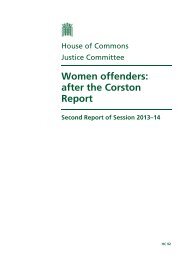Minority voices: Research into the access and acceptability of ... - MMC
Minority voices: Research into the access and acceptability of ... - MMC
Minority voices: Research into the access and acceptability of ... - MMC
- No tags were found...
You also want an ePaper? Increase the reach of your titles
YUMPU automatically turns print PDFs into web optimized ePapers that Google loves.
In a number <strong>of</strong> areas attempts to improve <strong>the</strong> availability <strong>of</strong> interpreters <strong>and</strong> to developadvocacy support <strong>and</strong> staff training on cultural awareness were reported.Mapping <strong>of</strong> services for young people from Black <strong>and</strong> minorityethnic groupsDuring <strong>the</strong> course <strong>of</strong> <strong>the</strong> service mapping, <strong>and</strong> subsequently during <strong>the</strong> fieldwork in <strong>the</strong> sampleareas, information about nearly 300 different services working in <strong>the</strong> mental health field wasreceived - although subsequent checking revealed that many <strong>of</strong> <strong>the</strong>se were for adults (<strong>and</strong>thus, although encompassing <strong>the</strong> 18-25 age group included in <strong>the</strong> <strong>Minority</strong> Voices sample agerange, were <strong>of</strong>ten not particularly ‘young people focused’) or were not, in any way, targeted onpeople from Black <strong>and</strong> minority ethnic communities.The research team also found that a number <strong>of</strong> services, most notably those that were focusedon young people from Black <strong>and</strong> minority ethnic groups, had recently closed or were underthreat <strong>of</strong> doing so, due to funding insecurities.This loss <strong>of</strong> provision is particularly worrying given <strong>the</strong> serious problems with fundinghighlighted in recent research <strong>into</strong> <strong>the</strong> funding <strong>of</strong> <strong>the</strong> Black Voluntary <strong>and</strong> Community Sectormore generally, 90 despite government recognition <strong>of</strong> <strong>the</strong> “distinctive skills, expertise <strong>and</strong>experience that <strong>the</strong> BME voluntary <strong>and</strong> community sector holds.” 91More detailed information about services that seemed to be targeted at young people fromBlack <strong>and</strong> minority ethnic communities, or that seemed in some way innovative or wellintegrated with o<strong>the</strong>r services (statutory <strong>and</strong> voluntary) or well used by young people, was<strong>the</strong>n sought by means <strong>of</strong> telephone interviews. Comparison <strong>of</strong> this material, alongside <strong>the</strong>information ga<strong>the</strong>red from young people <strong>and</strong> staff during <strong>the</strong> fieldwork, allowed <strong>the</strong> researchteam to identify a number <strong>of</strong> different dimensions <strong>of</strong> service delivery that appear to constitute‘good practice’ in working with this client group.The provision identified, <strong>and</strong> that is currently operational, spans a wide range <strong>of</strong> differentapproaches across <strong>the</strong> tiers <strong>of</strong> CAMHS provision, including:• Mental health projects based on a community development approach, sometimesworking with a defined Black <strong>and</strong> minority ethnic community or group <strong>and</strong>encompassing a range <strong>of</strong> treatment <strong>and</strong> support approaches, as well as raisingawareness <strong>and</strong> underst<strong>and</strong>ing <strong>of</strong> mental health.• General support projects for young people run by voluntary sector organisations, <strong>of</strong>tenwith a focus on housing (including direct provision), education or <strong>the</strong> provision <strong>of</strong> socialactivities but where specific aspects <strong>of</strong> <strong>the</strong> provision have subsequently been developedin response to client needs, to provide mental health support for identified groups <strong>of</strong>young people.• School-based provision, including lunch time drop-ins, residential trips, one-to-one <strong>and</strong>group-based counselling.• Targeted provision or specialist teams within existing CAMHS/NHS services <strong>of</strong>feringstaff that represent <strong>the</strong> different ethnic groups in that area, or workers with expertise inworking with Black <strong>and</strong> minority ethnic groups - <strong>and</strong> <strong>of</strong>fering support for young peopleexperiencing difficulties as a result <strong>of</strong> racism <strong>and</strong> ethnic identity issues, alongside o<strong>the</strong>rproblems that can face all young people such as anxiety <strong>and</strong> family relationshipdifficulties.• Telephone helplines <strong>and</strong> web-based advice <strong>and</strong> information, some aimed at specificethnic groups <strong>and</strong> o<strong>the</strong>rs about specific mental health problems such as depression,eating disorders <strong>and</strong> self-harm.• Volunteering, peer counselling, befriending <strong>and</strong> mentoring projects.• Support for young <strong>of</strong>fenders from Black <strong>and</strong> minority ethnic groups <strong>and</strong> those excludedfrom school.<strong>Minority</strong> Voices <strong>Research</strong> Report22
















